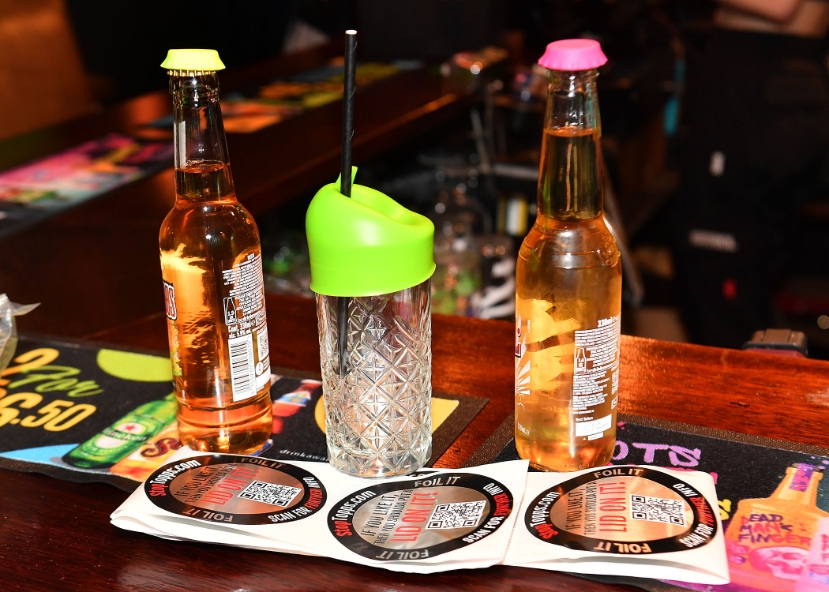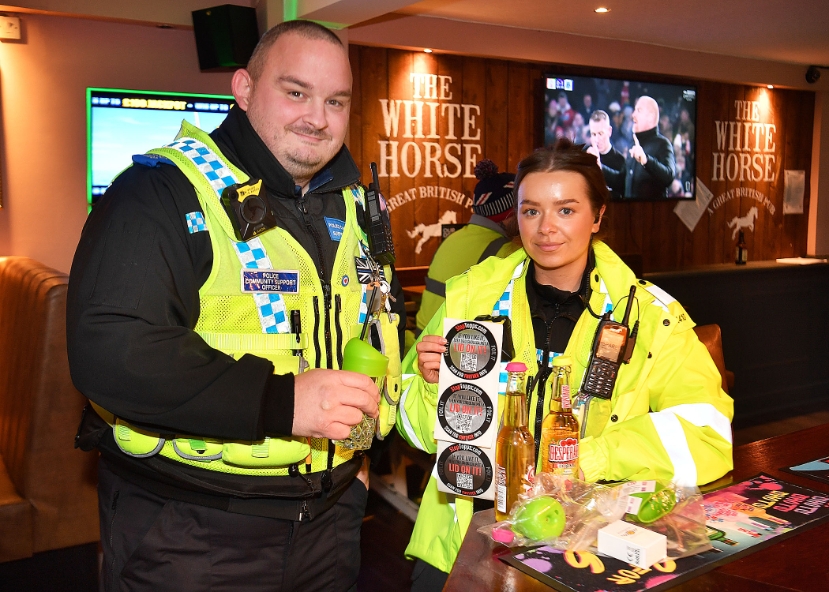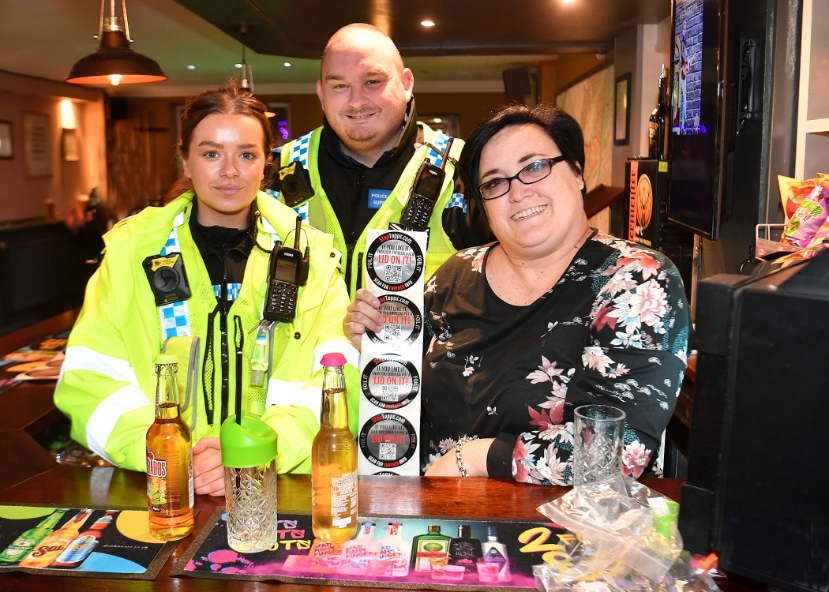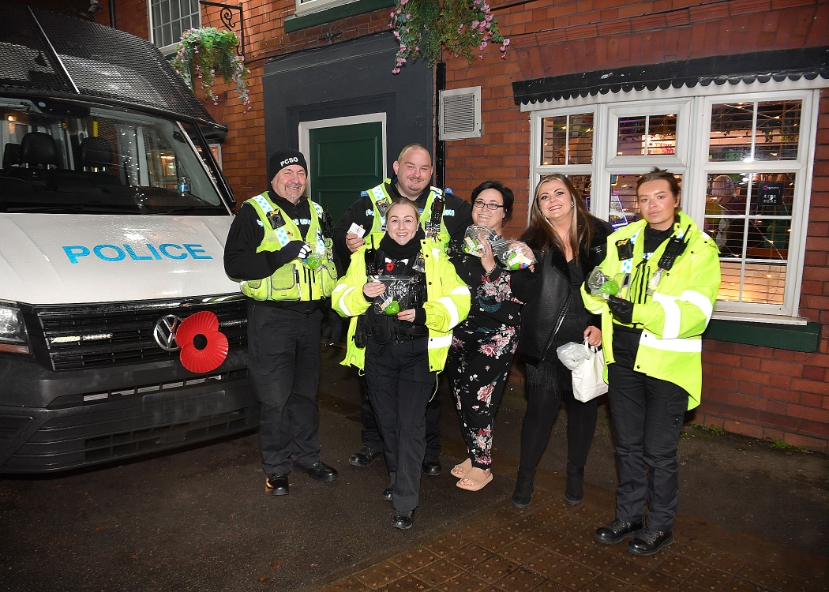With the start of December and the run up to Christmas, Greater Manchester Police Officers (GMP) and Police Community Support Officers (PSCO’s) launched a campaign at the weekend, to advise, and make female drinkers aware of the real dangers of having their drinks ‘spiked’ and the potential consequences that could arise.
As part of the Greater Manchester wide initiative Officers visited several Pubs, Bars and Clubs in the Irlam and Cadishead area. As well as offering advice and information, officers handed out around a hundred free kits that could help to stop female revellers, being targeted and having their drinks spiked on a night out.
PCSO’s Mark Hutton and Paul Greenhalgh said:
“Irlam and Cadishead officers worked with the licensees of pubs, clubs, and bars throughout Irlam and Cadishead to raise awareness on drink spiking. Irlam and Cadishead has held the longest running Pub watch scheme in Manchester, since being established in 2013 and we are working together to address issues throughout the district.
Across the Salford West District there have only been around 15 reports so far this year. But we know the real figure is probably considerably higher.

97% of Victims don’t report drink spiking incidents to the Police and some have said things like, ‘Not feeling there is enough evidence’ ‘I didn’t realise until I thought it was too late.’, or ‘I wasn’t aware of the process and what it would entail.’ and ‘I didn’t think the police would believe me.’ Please if you think you have had your drinks spiked report it to the Police.”
The kits contain colourful reusable plastic caps and glass covers that should be used to go on the top of drinks bottles and glasses to prevent them being tampered with. The caps can easily be carried in a purse or handbag whilst out on a night out. As well as the bottle tops and drinks cover, the kits handed out included strips to check if a drink has been spiked, a personal attack alarm and more.

Drinks ‘spiking’ has always been an issue in pubs and clubs across the country with the potentially devastating issues of females being targeted by predators, that could help to be avoided by keeping drink bottles and glasses covered whilst enjoying an evening out.
The initiative is supported by the Irlam and Cadishead Pub and Club Watch Scheme, landlady of the White Horse Marcelle Steer said:
“Anything that can help to keep people safe when enjoying a night out can only be a good thing. Sadly, there are those out there that are only interested in themselves. Let’s hope that this advice and support keeps everyone safe this Christmas.”

Police Officers Ellie Abram and Katie Raistrick added:
“Sadly it happens all too often that females who have just gone out with their friends or even family, on a night out potentially face having their drinks ‘spiked’ by unscrupulous individuals or gangs. The consequences could end up being devastating for those involved and this campaign aims to make potential targets more aware of the drinks spiking issues and to keep their drinks covered at all times.”
The penalties for drink spiking are severe for those individuals involved and prosecuted but that does not seem to deter some of the lower life in our society.
Be safe this Christmas, have a great time but be vigilante and do everything you can to keep your drinks with you, in your sight and always covered if you can. Always better to be safe than sorry…

How can I avoid being spiked?
The following steps may help prevent drink spiking:
- Never leave your drink unattended and keep an eye on your friends’ drinks.
- Don’t accept a drink from someone you don’t know.
- Consider sticking to bottled drinks and avoiding punch bowls or jugs of cocktails.
- Don’t give out your address to someone you have just met.
- If you think your drink’s been tampered with, don’t drink it – tell a trusted friend or relative immediately.
- Before going out, let someone know where you’re going and what time you expect to be home.
- Make plans for your journey home.
- Avoid taking expensive equipment with you or anything that could be a target for thieves.
- If you’re travelling abroad, be aware of the local area and where you can find help.
- Of course, if you follow this advice and use StopTopps too, then you will be making it very difficult for a potential drink-spiker to target you.
- If you start to feel strange or more drunk than you should be, get help immediately.
What should I do if I think my drink has been spiked?
- Immediately tell someone you trust.
- If you need urgent help, call 999. Be wary of accepting help from a stranger and don’t leave with someone you don’t know.
- If you feel unwell, someone you trust should take you to your nearest A&E department. Tell the medical staff that you think your drink’s been spiked.
- Arrange for a trusted friend or relative to take you home and stay with you until the drugs have fully left your system.
- Report it to the police as soon as you can. They may ask you to provide blood and urine samples.
- Most drugs leave the body within 72 hours of being taken (the date rape drug GHB leaves the body within 12 hours), so it’s important to be tested as soon as possible.
- If you’re abroad, get help from a travel representative or local medical services, or ask a bar or hotel manager to call local police.
- https://www.nhs.uk/live-well/healthy-body/drink-spiking-and-date-rape-drugs/
How do I know if my drink has been spiked?
Most date rape drugs take effect within 30 minutes, and symptoms usually last for several hours.
But if you pass out, it’ll be hard to know the full effect. You may still feel some of the symptoms of a date rape drug after a night’s sleep.
Although your symptoms will depend on which substance has been used, they usually include some of the following:
- Lowered inhibitions.
- Difficulty concentrating or speaking.
- Loss of balance and finding it hard to move.
- Visual problems, particularly blurred vision
- Memory loss (amnesia) or ‘blackouts’.
- Feeling confused or disorientated, particularly after waking up (if you have been asleep).
- Paranoia (a feeling of fear or distrust of others).
- Hallucinations (seeing, hearing or touching things that aren’t there) or having an ‘out of body’ experience.
- Nausea and vomiting.
- Unconsciousness.
Photos: Bill McLaughlin



Recommended Comments
There are no comments to display.
Please sign in to comment
You will be able to leave a comment after signing in
Sign In Now